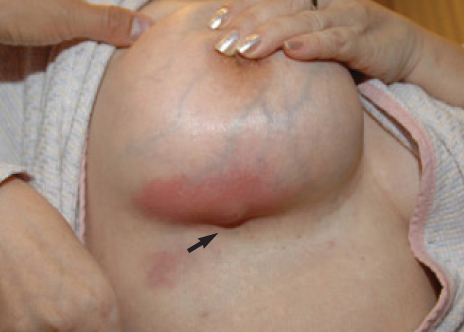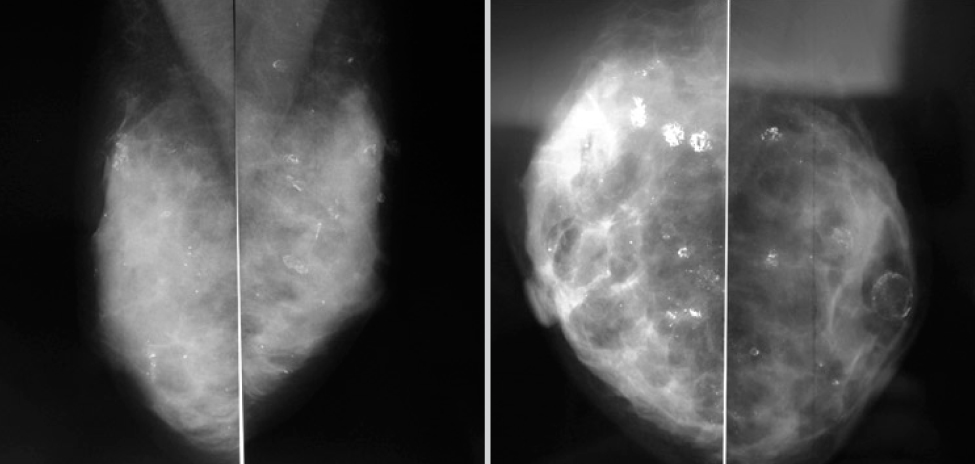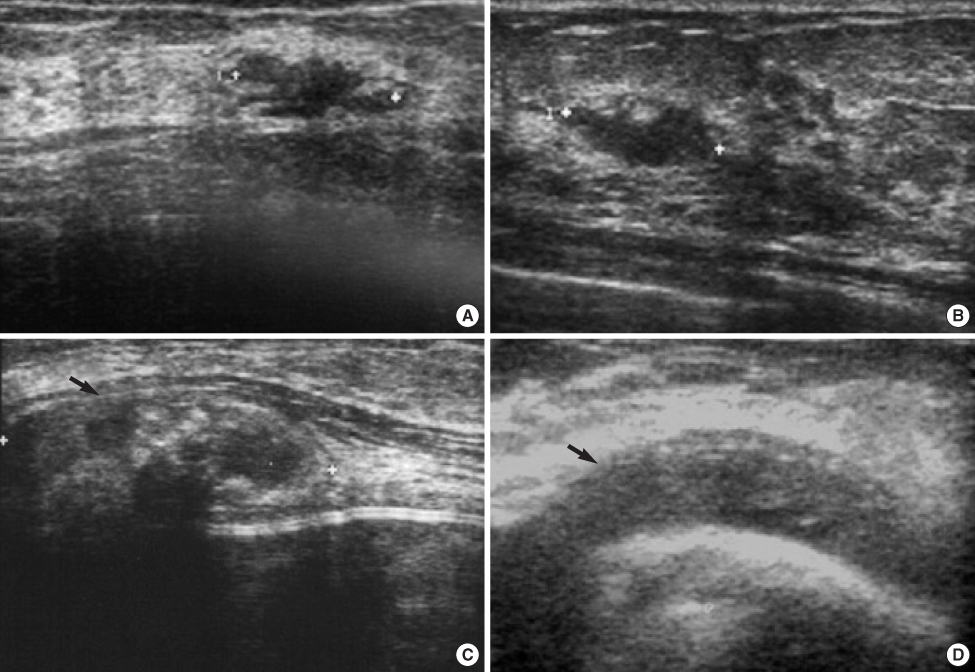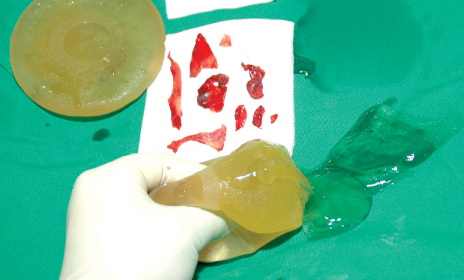J Breast Cancer.
2009 Mar;12(1):54-59. 10.4048/jbc.2009.12.1.54.
Complications of Augmentation Mammaplasty with Autologous Fat Grafts
- Affiliations
-
- 1MD Clinic, Seoul, Korea. dahl65@hanmail.net
- KMID: 2286580
- DOI: http://doi.org/10.4048/jbc.2009.12.1.54
Abstract
-
PURPOSE: Autolougous fat grafting to the breast for cosmetic enlargement remains controversial because the efficacy and the complications due to fat necrosis are unclear.
METHODS
Ten cases who underwent autologous fat grafting to the breast for enlargement and visited author's clinic from October 2006 to March 2008 were evaluated retrospectively. Mammography, ultrosonography, culture, cytology, operative findings and results were reviewed for each cases.
RESULTS
The study group consisted of 7 cases for additional augmentation mammaplasty, 1 case for breast abscess, 2 cases for breast examination. Two of 7 augmentation cases had multiple palpable masses. One of 2 cases for breast examination had fat grafts 20 months ago and have suffered from painful huge masses especially on exercise. One case with abscess had fat graft 4 months ago and have suffered from painful reddish swelling. On mammography of 9 cases except 1 breast abscess, malignancy could not be excluded in 2 cases because of bizarre forms of multiple microcalcifications. On ultrasonography of 8 cases, there were ill defined hypoechoic masses in 2 cases which needed additional cytology for rule out malignancy. There were implant puncture in all 2 cases with silicone implants, and in case with abscess, there were S. epidermidis in culture. Among 7 augmentation mammaplasty cases, removal of fat necrosis was performed simultaneously in 1 case with severely palpable masses but postoperative seroma formation and capsular contracture occurred.
CONCLUSION
Autologous fat grafting for breast augmentation can make masses, abscess and microcalcifications on mammography due to fat necrosis which compromise breast cancer detection. Additional study is necessary to evaluate the efficacy of fat stem cell grafts as an alternative to traditional method.
MeSH Terms
Figure
Reference
-
1. Neuber GA. Fettransplantation. Chir Kongr Verhandl Deutsche Gesellschaft fur Chirurgie. 1893. 22:66. cited from Langer S, Sinitsina I, Biberthaler P, Krombach F, Messmer K. Revascularization of transplanted adipose tissue: a study in the dorsal skinfold chamber of hamsters. Ann Plast Surg 2002;48:53-9.2. Peer LA. Peer LA, editor. Transplantation of fat. Transplantation of tissues. 1959. Baltimore: William and Wilkins Co.;165.3. Murray DS. Breast augmentation with gluteal dermofat grafts: a 5-10 year follow up. Br J Plast Surg. 1976. 29:1–4.4. Watson J. Some observations on free fat grafts: with reference to their use in mammaplasty. Br J Plast Surg. 1959. 12:263–274.
Article5. Bircoll M, Novack BH. Autologous fat transplantation employing liposuction techniques. Ann Plast Surg. 1987. 18:327–329.
Article6. Bircoll M. Autologous fat transplantation to the breast. Plast Reconstr Surg. 1988. 82:361–362.
Article7. Fox BS. Autologous fat injection and breast augmentation. Med J Aust. 1988. 149:284–286.
Article8. Matsudo PK, Toledo LS. Experience of injected fat grafting. Aesthetic Plast Surg. 1988. 12:35–38.
Article9. Pohl P, Uebel CO. Complications with homologous fat grafts in breast augmentation surgery. Aesthetic Plast Surg. 1985. 9:87–89.
Article10. Hartrampf CR Jr, Bennett GJ. Autologous fat from liposuction for breast augmentation. Plast Reconstr Surg. 1987. 80:646.11. Dixon PL. Autologous fat injection and breast augmentation. Med J Aust. 1988. 148:537.
Article12. Spear SL, Wilson HB, Lockwood MD. Fat injection to correct contour deformities in the reconstructed breast. Plast Reconstr Surg. 2005. 116:1300–1305.
Article13. Missana MC, Laurent I, Barreau L, Balleyguier C. Autologous fat transfer in reconstructive breast surgery: indications, technique and result. Eur J Surg Oncol. 2007. 33:685–690.
Article14. Castello JR, BarrosJ , Vazquez R. Giant liponecrotic pseudocyst after breast augmentation by fat injection. Plast Reconstr Surg. 1999. 103:291–293.
Article15. Chajchir A, Benzaquen I. Fat-grafting injection for soft tissue augmentation. Plast Reconstr Surg. 1989. 84:921–934.16. Niechajev I, Sevcuk O. Long-term results of fat transplantation: clinical and histologic studies. Plast Reconstr Surg. 1994. 94:496–506.17. Langer S, Sinitsina I, Biberthaler P, Krombach F, Messmer K. Revascularization of transplanted adipose tissue: a study in the dorsal skinfold chamber of hamsters. Ann Plast Surg. 2002. 48:53–59.
Article18. Ersek RA. Transplantation of purified autologous fat : a 3-year follow-up is disappointing. Plast Reconstr Surg. 1991. 87:219–227.19. Peer L. Loss of weight and volume in human fat grafts with postulation of cell survive theory. Plast Reconstr Surg. 1950. 5:217–230.20. Shakhov AA. Fat transplantation and breast augmentation. Aesthetic Plast Surg. 2002. 26:323–325.
Article21. Yamaguchi M, Matsumoto F, Bujo H, Shibasaki M, Takahashi K, Yoshimoto S, et al. Revascularization determines volume retention and gene expression by fat grafts in mice. Exp Biol Med. 2005. 230:742–748.
Article22. Karacaoglu E, Kizilkaya E, Cermik H, Zienowicz R. The role of recipient sites in fat-graft survival: experimental study. Ann Plast Surg. 2005. 55:63–68.23. Coleman SR, Saboeiro AP. Fat grafting to the breast revisited: safety and efficacy. Plast Reconstr Surg. 2007. 119:775–787.
Article24. Zheng DN, Li QF, Lei H, Zheng SW, Xie YZ, Xu QH, et al. Autologous fat grafting to the breast for cosmetic enhancement: experience in 66 patients with long-term follow up. J Plast Reconstr Aesthet Surg. 2008. 61:792–798.
Article25. Cheung M, Houssami N, Lim E. The unusual mammographic appearance of breasts augmented by autologous fat injection. Breast. 2000. 9:220–222.
Article26. Kwak JY, Lee SH, Park HL, Kim JY, Kim SE, Kim EK. Sonographic findings in complications of cosmetic breast augmentation with autologous fat obtained by liposuction. J Clin Ultrasound. 2004. 32:299–301.
Article27. Zocchi ML, Zuliani F. Bicompartmental breast lipostructuring. Aesthetic Plast Surg. 2008. 32:313–328.
Article28. Zuk PA, Zhu M, Ashjian P, De Ugarte DA, Huang JI, Mizuno H, et al. Human adipose tissue is a source of multipotent stem cells. Mol Biol Cell. 2002. 13:4279–4295.
Article29. Yoshimura K, Sato K, Aoi N, Kurita M, Hirohi T, Harii K. Cell-assisted lipotransfer for cosmetic breast augmentation: supportive use of adipose-derived stem/stromal cells. Aesthetic Plast Surg. 2008. 32:48–55.
Article
- Full Text Links
- Actions
-
Cited
- CITED
-
- Close
- Share
- Similar articles
-
- The use of autologous fat grafts in breast surgery: A literature review
- Clinical evaluation of autologous fat graft for facial deformity: a case series study
- Fat grafts enriched with adipose-derived stem cells
- Augmentation Rhinoplasty with Dermofat Graft & Fat Injection
- Treatment of an abscess after massive autologous fat transplantation for breast augmentation with real-time ultrasonography-guided liposuction







